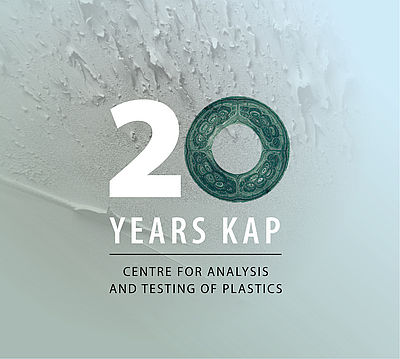Various laboratories for mechanical testing, rheometry, microscopy and physical analysis existed at IKV long before the KAP was founded. However, they were attached to different departments and tended to be project-specific in their activities. With the founding of the centre on 1 March 2003, the IKV merged this testing and analysis competence and focused it more strongly on dealing with direct and practical questions from industry. In this way, IKV was now able to offer its services to industrial partners in a more competent and structured way and at the same time could put the often complex testing and analysis work for public research and development projects on a more solid basis. Part of the founding idea was the development of systematic quality management as well as professional project management.
With the first certification according to the quality management standard DIN EN ISO 9001:2000 on 16 January 2006, an important milestone on the way to the KAP's success was achieved. Very quickly, the KAP developed a system for a holistic damage analysis in order to answer industrial enquiries efficiently. Since 2007, the KAP staff have also been sharing this knowledge in regular seminars.
New vocational training course was created
This specific field of work required an equally specific qualification of the junior staff. A training course for apprentices in this field did not exist 20 years ago. The vocational profile of the materials tester came quite close to the required profile, but at that time it was still strongly oriented towards the testing of metal materials. This led to the bizarre situation that in 2008 the Institute for Plastics Processing initially offered training in materials testing for metal technology.
However, the KAP also took this as an opportunity to diversify this vocational training further. Together with the BIBB (Federal Institute for Vocational Education and Training in Bonn), the Chamber of Industry and Commerce and a large committee, it designed the vocational training course "materials tester for plastics technology" and offered training for the first time in 2013.
Exploiting synergies from research and industrial experience: Plasma technology at the KAP
In 2013, the plasma and surface technology working group was integrated into the KAP. The deciding factor was the fact that the head of the KAP, Prof. Rainer Dahlmann, had completed his doctorate at IKV in the field of plasma technology and was therefore the ideal person for the scientific management and supervision of the research field. In addition, the cooperation between the plasma technology unit at IKV and the KAP was very close from the beginning, since research in plasma technology is inconceivable without accompanying instrumental analysis.
Analytics and plasma research benefit equally from the synergies. In many cases, it has now been possible to put the basic research of the plasma working groups into practice, e.g. in the form of transfer projects. One example is the successful barrier finishing of PET beverage bottles using a special layer chemistry generated in plasma, which has now been implemented on an industrial scale. In 2020, a further development of this work led to the founding of a spin-off company: The Ionkraft GmbH pursues the industrial implementation of such designated recyclable barrier and protection systems based on plasma, especially for large-volume hollow bodies.
Recyclable barrier layers can also be applied to sheets or films. In this way, they can not only protect the contents of any type of packaging, but also prevent the migration of substances into the contents. Plasma technology can therefore make an important contribution to meeting the politically required recycling quotas. The plasma groups at IKV are currently working on this.
Efficient trouble-shooting for industry
Damage analysis of plastic products is one of the KAP's core competencies. For this purpose, it has developed a systematic procedure that produces not only analysis results, but also classifies them and uses them to develop possible solutions. In order to obtain the most complete possible picture of the damage, relevant information is collected not only on the damage pattern itself, but also on the environment. Close coordination with the client is essential in order to be able to record details that may at first glance appear irrelevant. Based on this information, the scientists at KAP create a damage hypothesis that determines the selection of concrete tests and instrumental analyses. From the results, they can determine reasons for failure and derive recommendations for action.
In the field of material characterisation, the topic of recyclate analysis is currently becoming more and more relevant. Here, the KAP has developed an approach that is both application-oriented and targeted. It is intended to be able to make reliable statements about the processability and area of application of specific recyclates with as little analytical effort as possible.
With its 25 employees plus student assistants, the interdisciplinary team of physicists, chemists, engineers, technicians and materials testers benefits both from the good infrastructure due to the bundling of activities and from the close proximity to research when answering questions from industry. The basis of its work is the broad range of analysis and testing possibilities with the highest level of instrumentation, which is continuously being expanded and upgraded. The team now manages around 500 projects per year, from materials analysis and component testing to trouble-shooting in production and damage analysis in a wide variety of contexts.
Contact for questions
Prof. Dr. rer. nat. Rainer Dahlmann
+49 241 80-25928
rainer.dahlmann@ikv.rwth-aachen.de

